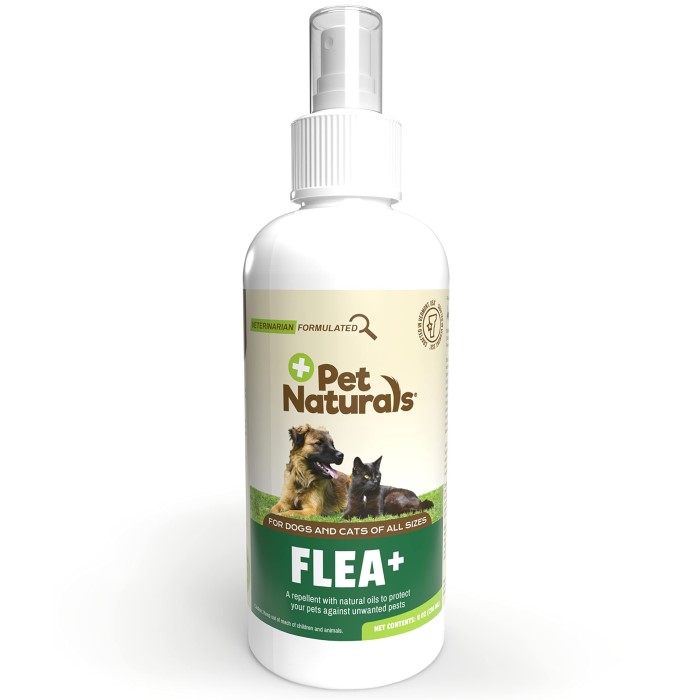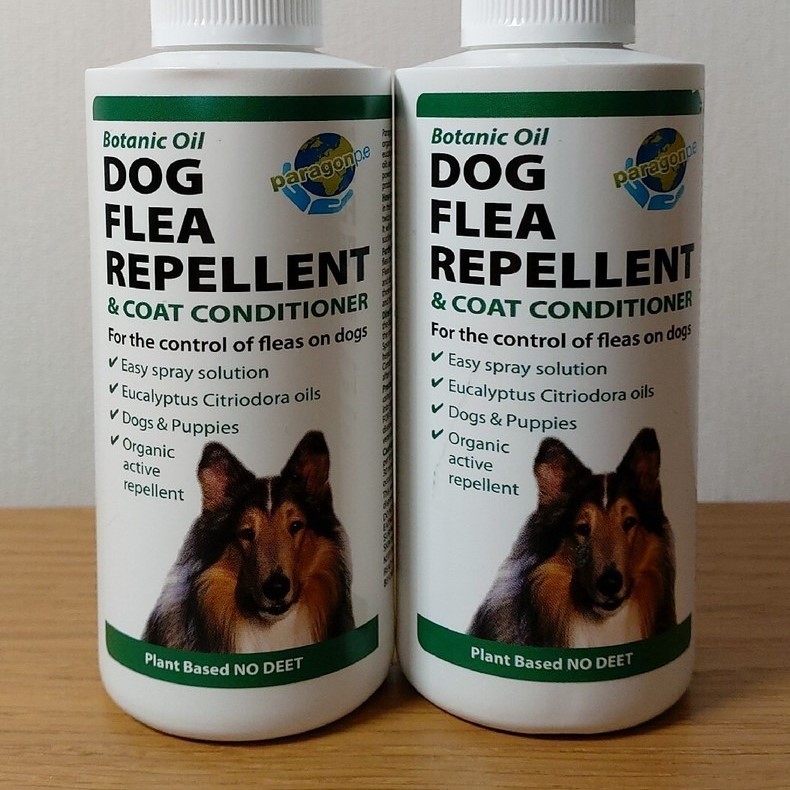Introduction: Understanding the Need for Natural Flea Repellents
As summer approaches, dog owners often face an age-old dilemma: how to keep their furry friends safe from the pesky fleas that thrive in warm weather. This leads many to search for a natural flea repellent for dogs. Traditional flea treatments often involve potent chemicals that may not only be harmful to pets but can also raise concerns for pet owners looking for holistic and safe solutions. The appeal of natural flea repellents lies in their ability to provide effective pest control without the side effects associated with chemical treatments.

Natural flea repellents work by utilizing ingredients such as essential oils, herbs, and everyday household items that can deter fleas while being gentle on your pet’s skin and health. In this article, we will explore essential tips, natural ingredients, and safe home remedies for using natural flea repellents, focusing on methods every pet owner should consider. By the end of this guide, you will be well-equipped to protect your dogs from fleas using natural alternatives.
The Importance of Flea Control
Fleas are not just a nuisance; they pose several health risks to dogs. These tiny parasites can cause:
- Skin Irritation: Fleas bite into the skin to feed on blood, which can lead to itching, redness, and inflammation.
- Allergic Reactions: Some dogs may develop allergies to flea saliva, resulting in more severe skin conditions such as dermatitis.
- Anemia: A heavy infestation can lead to significant blood loss, especially in puppies or smaller breeds, which may cause anemia and subsequent health issues.
- Tapeworms: Fleas can carry tapeworm larvae. If a dog ingests a flea during grooming, it can lead to a tapeworm infection.
Given these risks, maintaining consistent flea control is essential for the overall health and well-being of your pet.
Why Choose Natural Flea Repellents?
With growing concerns about the side effects of chemicals used in pet care, many dog owners are shifting towards natural flea repellents for their numerous benefits:
1. Safety for Your Pet
One of the most compelling reasons to choose natural flea repellents is the safety they provide. Traditional chemical treatments often lead to adverse reactions in dogs, such as skin irritations or more severe health issues. Natural ingredients usually have a much lower risk of side effects, making them a safer alternative for sensitive pets.
2. Environmental Impact
Many commercial flea treatments contain harsh chemicals that can leach into the ground and harm local ecosystems. By choosing natural flea repellents, you contribute to a more sustainable environment, reducing the risk of pollution and negative effects on wildlife.
3. Holistic Approach
Natural flea repellents align well with holistic pet care. This philosophy emphasizes the overall well-being of pets rather than just treating symptoms. By utilizing natural ingredients, you support a healthier lifestyle for your dog.
4. Cost-Effectiveness
Natural remedies can often be more economical than their chemical counterparts. DIY natural flea repellents can be created at home using simple and inexpensive ingredients, saving you money while effectively protecting your pet.
Common Natural Ingredients for Flea Repellents
Various natural flea repellent for dogs are known for their effectiveness in repelling fleas. Here’s a list of popular options that can be used safely:
1. Essential Oils
Essential oils have been used for centuries for their myriad benefits, including pest control. Here are some of the most effective essential oils for flea repellent:
- Lavender Oil: Known for its calming scent, lavender oil is also an effective flea deterrent. Its soothing properties can help calm your dog while keeping fleas away.
- Cedarwood Oil: This oil not only smells great but also naturally repels fleas and ticks. Its woody aroma is safe for dogs and effective in deterring pests.
- Peppermint Oil: The strong scent of peppermint oil is unappealing to fleas. It provides a refreshing fragrance while helping to keep your pet flea-free.
- Lemongrass Oil: Like cedarwood, lemongrass has a strong citrus scent that is effective at repelling fleas. This oil is also safe for dogs when diluted properly.
- Rosemary Oil: This oil has properties that repel fleas while also providing anti-inflammatory benefits to soothe your pet’s skin.
Note: Essential oils should always be used with caution. They are highly concentrated and should be diluted before applying them to your dog’s skin. Always consult with your veterinarian before using essential oils, especially if your dog has existing health issues.
2. Apple Cider Vinegar
Apple cider vinegar (ACV) can serve as a natural flea repellent. Its strong scent creates an unwelcoming environment for fleas. You can mix equal parts of water and ACV in a spray bottle and apply it to your dog’s coat. The vinegar also helps to balance the skin’s pH, making it less attractive to fleas.
3. Diatomaceous Earth
Food-grade diatomaceous earth (DE) is a safe, natural powder made from the fossilized remains of tiny aquatic organisms. When sprinkled on your dog’s coat or around the home, it works by dehydrating fleas upon contact. DE is safe for pets but should be kept away from their eyes and nose to avoid irritation.
4. Lemon
Lemon contains a compound called limonene, which is known for its flea-repelling properties. You can create a lemon spray by boiling sliced lemons in water, letting it steep overnight, and then straining the liquid into a spray bottle. This natural solution can be applied to your dog’s coat for added protection.
5. Herbal Flea Collars
You can make homemade flea collars by infusing cotton fabric with essential oils like lavender, cedarwood, or peppermint. Simply dabbing a few drops of these oils on a cotton collar can help repel fleas while adding a natural fragrance.
Tips for Implementing Natural Flea Repellents
Adopting natural flea repellents involves more than just applying a solution to your dog’s coat. Here are some practical tips to effectively implement flea repellent strategies:
1. Routine Grooming
Regular grooming is essential for flea control. Brushing your dog’s coat frequently not only removes loose fur and dirt but also helps you spot any fleas early. Use a flea comb specifically designed to trap fleas and their eggs. This type of grooming combined with natural repellents keeps flea populations under control.
2. Bathing
Bathing your dog with a natural pet shampoo can eliminate fleas and improve their coat’s health. A natural shampoo with ingredients like oatmeal or aloe can soothe your dog’s skin while cleansing. After bathing, you can apply a natural flea repellent spray.
3. Create a Flea Spray
Making a simple flea repellent spray at home can be an effective way to protect your dog. Combine 1 cup of water with 10-15 drops of your chosen essential oil (like lavender or cedarwood) in a spray bottle. Shake well and then apply this solution evenly on your dog’s coat, avoiding contact with the eyes.
4. Flea-Repellent Bedding
Consider adding flea-repelling properties to your dog’s bedding. Sprinkling some food-grade diatomaceous earth in their sleeping area can help control fleas. Additionally, washing their bedding regularly in hot water helps eliminate any potential flea eggs or larvae.
5. Environmental Control
Fleas don’t just live on your dog; they can infest your home and yard. Maintaining a clean living environment is crucial in preventing flea infestations. Vacuum carpets, clean upholstery, and wash blankets frequently to keep fleas at bay.
Frequently Asked Questions (FAQ)
What kills fleas on dogs naturally?
Natural solutions that can kill fleas on dogs include using essential oils, applying diluted apple cider vinegar, and utilizing food-grade diatomaceous earth. Regular grooming and bathing are also essential to reducing flea populations effectively.
What do holistic vets recommend for flea and tick prevention?
Holistic veterinarians often recommend a combination of natural treatments such as essential oils, herbal supplements, and environmentally friendly cleaning products. They may also suggest maintaining a clean living space and a healthy diet to boost your dog’s overall immune system.
What can I give my dog to eat to repel fleas?
Adding certain foods to your dog’s diet may help repel fleas. Ingredients like garlic (in moderation), brewer’s yeast, and apple cider vinegar can be effective. Always consult with a veterinarian before adding new foods to your dog’s diet to ensure they are safe.
Can I spray lemon juice on my dog to repel fleas?
While lemon juice has natural flea-repellent properties, it should be used cautiously. Straight lemon juice can irritate your dog’s skin, so it’s best to create a diluted lemon spray before applying. Always test a small area first to check for sensitivities.
The Importance of a Clean Environment
In addition to treating your dog, it’s essential to create a flea-free environment. Here’s how to keep your home and yard conducive to flea prevention:
1. Regular Vacuuming
Vacuuming frequently and thoroughly is one of the best ways to eliminate fleas and their eggs from your home. Make sure to vacuum areas where your dog spends a lot of time, including their bed, favorite resting spots, and even your car. Don’t forget to dispose of the vacuum bag or clean the canister afterward.
2. Washing Bedding
Washing your dog’s bedding, toys, and any fabric they frequently come into contact with is crucial. Using hot water can kill fleas and their eggs. It’s an excellent practice to do this weekly during flea season.
3. Yard Maintenance
Maintaining your yard is just as important. Regularly mowing the lawn and trimming bushes can help prevent flea habitats. Consider using natural yard sprays that are safe for pets to eliminate fleas outdoors without harsh chemicals.
Combining Natural and Conventional Methods
While natural flea repellents can be effective, some may find a combination of natural and conventional methods works best. Here’s how to create a balanced approach:
1. Consult Your Veterinarian
If your dog is experiencing a severe flea infestation, consulting your veterinarian is vital. They can provide expert advice on effective treatments, whether natural or conventional, and will help tailor a solution that fits your pet’s needs.
2. Monitor Your Dog’s Health
Regularly check your dog for any signs of fleas, skin irritations, or allergic reactions. If you notice persistent problems or ineffective flea control, re-evaluating your methods may be necessary.
Additional Tips for Maintaining Flea Prevention
Beyond natural repellents, consider these complementary preventive measures:
1. Keep Dogs Away from Infested Areas
If you know areas prone to fleas, such as heavily wooded parks or places with high grass, keep your dog away from those spots whenever possible. Limiting exposure helps reduce the risk of flea infestation.
2. Maintain a Healthy Diet
A healthy diet can bolster your dog’s immune system, making it easier for them to fend off pests. Consult your veterinarian about dietary options that encourage overall health and provide natural flea resistance.
3. Utilize Herbal Remedies
Herbs such as rosemary, basil, and mint can be planted around your home to naturally deter fleas. Incorporating these plants into your garden can add an extra layer of protection.
Conclusion: Natural Flea Repellent Strategies for Happy Dogs
In conclusion, using a natural flea repellent for dogs can be an effective strategy to keep your furry friends comfortable and pest-free. By incorporating essential oils, vinegar, diatomaceous earth, and simple home remedies, you can create a holistic approach to flea prevention that aligns with safe pet care practices.
As you consider the methods and natural ingredients discussed in this guide, remember that consistent grooming, environmental control, and regular monitoring are crucial components of effective flea prevention. Don’t hesitate to consult your veterinarian for personalized recommendations that suit your dog’s specific needs.
With the right natural flea repellents and a proactive approach, you can help ensure your dog enjoys a healthy, happy life free from fleas. Embrace the benefits of natural solutions and take an active role in protecting your beloved pet throughout the warmer months!












